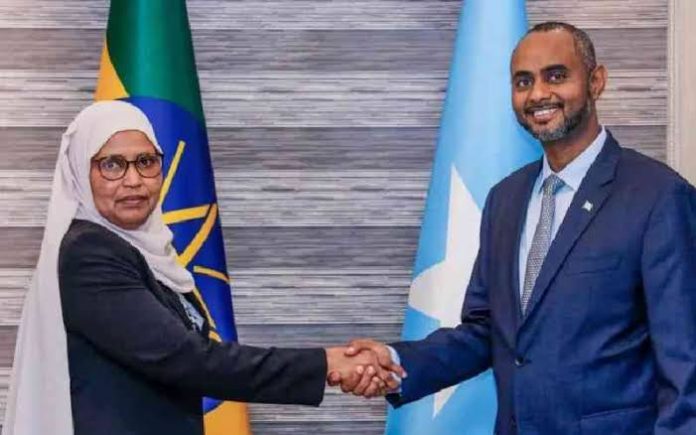Facebook Twitter (X) Instagram Somali Magazine - People's Magazine
Ethiopia’s involvement in Somalia’s ongoing peacekeeping efforts has drawn attention as the African Union Transition Mission in Somalia (ATMIS) is replaced by the African Union Support and Stabilization Mission in Somalia (AUSSOM). Initially, Mogadishu resisted Ethiopia’s participation, citing sovereignty concerns and unresolved tensions stemming from Ethiopia’s sea access agreement with Somaliland. However, a breakthrough came last month with the Ankara Declaration, mediated by Türkiye, which facilitated discussions for Ethiopia’s inclusion in the new mission.
While the Ankara Declaration did not directly address Somalia’s concerns over Ethiopia’s role, it reaffirmed both nations’ commitment to Somalia’s sovereignty, unity, and territorial integrity. It also outlined technical talks regarding Ethiopia’s sea access, indirectly influencing the AUSSOM negotiations. These talks, facilitated by Türkiye, are set to begin in late February 2025, with a four-month window for resolution.
As part of ongoing diplomatic efforts, Somali Foreign Minister Ali Omar Huruse visited Ethiopia, followed by Ethiopian Defense Minister Aisha Mohammed’s reciprocal visit to Mogadishu. These visits were seen as critical steps toward advancing peace discussions and addressing lingering tensions. Analysts argue that Ethiopia’s involvement in AUSSOM remains a pivotal factor in regional stability, especially given Ethiopia’s past peacekeeping contributions and experience combating Al-Shabaab.
The United Nations Security Council approved the transition from ATMIS to AUSSOM on December 27, 2024, with operations commencing on January 1, 2025. The UN-led force aims to support the Somali government in reclaiming territories previously controlled by Al-Shabaab while ensuring regional stability. Although Ethiopia’s precise role in AUSSOM is yet to be defined, recent diplomatic exchanges have reinforced commitments from both Ethiopia and Somalia to collaborate on the mission.
Tensions between Ethiopia and Somalia have persisted, particularly concerning Ethiopia’s maritime deal with Somaliland, which Mogadishu views as a threat to its sovereignty. However, the Ankara Declaration appears to have eased some tensions, with technical negotiations planned to address Ethiopia’s access to the sea while keeping Somalia’s territorial integrity in focus.
Experts argue that excluding Ethiopia from AUSSOM could be detrimental to the region’s security. Ethiopian forces have a long history of combating Al-Shabaab and securing strategic regions like Southwest Somalia and parts of Gedo and Jubbaland. Some analysts, including East African political commentator Prof. Mohamed Abdel-Ahmed, view the Ankara Declaration as a positive step, but caution that its success hinges on the technical outcomes of the scheduled negotiations.
The involvement of multiple regional actors further complicates the situation. Egypt, which has diplomatic tensions with Ethiopia over the Grand Ethiopian Renaissance Dam (GERD), has increased its diplomatic engagement with Somalia. This shift has raised concerns over conflicting alliances and the potential for further regional polarization. Mohamed warned that the Somali federal government’s simultaneous diplomatic outreach to both Cairo and Addis Ababa may have created an imbalance, emphasizing the need for a more cohesive strategy.
Ethiopian defense and foreign policy experts argue that the exclusion of Ethiopian forces from AUSSOM would provide a strategic advantage to Al-Shabaab. Ethiopia has approximately 3,000 troops officially deployed under AU peacekeeping mandates in Somalia, along with an estimated 5,000 to 7,000 soldiers operating under bilateral agreements with the Somali government. Ethiopia’s experience in counterterrorism operations makes its role crucial in maintaining security along key border regions.
The geopolitical complexities surrounding Ethiopia’s involvement are deeply rooted in historical tensions, particularly Ethiopia’s maritime ambitions. The Memorandum of Understanding (MoU) signed between Ethiopia and Somaliland last year sparked concerns in Mogadishu over potential territorial violations. While the Ankara Declaration has eased some of these tensions, uncertainties remain about how Ethiopia’s quest for sea access will impact its long-term relations with Somalia.
Public policy advisor Dr. Constantinos Berhutesfa has emphasized Ethiopia’s critical role in supporting Somalia’s stability. He described Ethiopian forces as “battle-tested” and effective in counterinsurgency operations, stressing that their presence is essential not only for Somalia’s security but also for Ethiopia’s regional interests.
The Somali government’s growing ties with Egypt have further complicated the diplomatic landscape. Egypt’s historical opposition to Ethiopia’s regional influence, particularly in the context of GERD, raises concerns about potential strategic rivalries. However, some analysts believe the Ankara Declaration has successfully de-escalated tensions, at least for the short term.
As technical talks between Ethiopia and Somalia approach, regional stability will heavily depend on both nations’ ability to navigate their complex relationship. The success of AUSSOM, as well as the broader security of the Horn of Africa, hinges on the continuation of constructive dialogue and mutual cooperation between Addis Ababa and Mogadishu.

